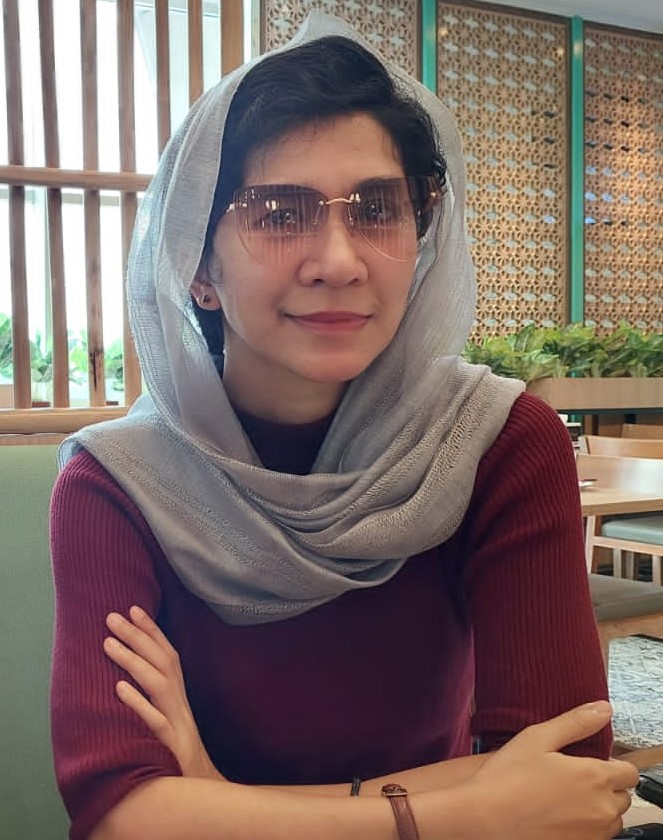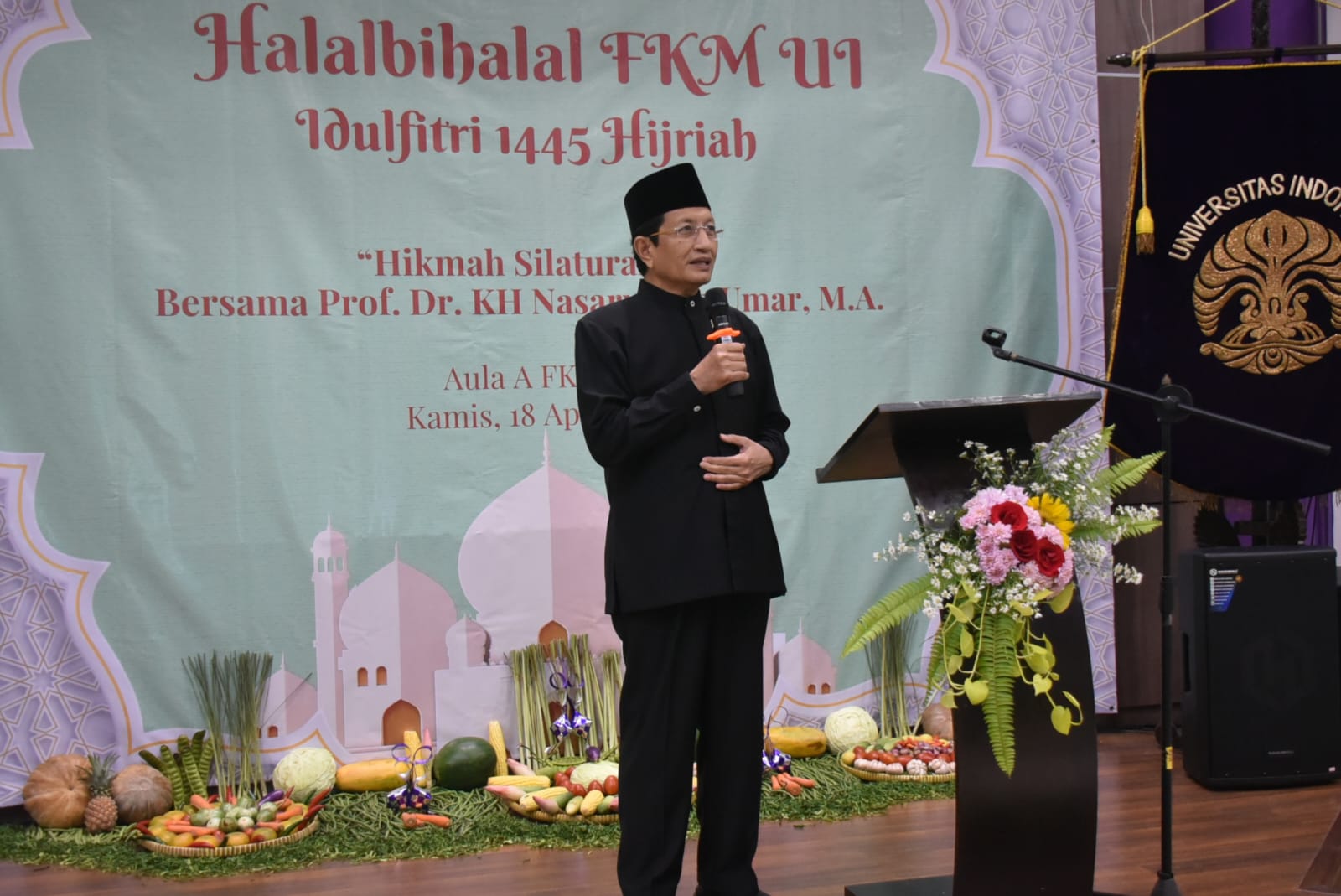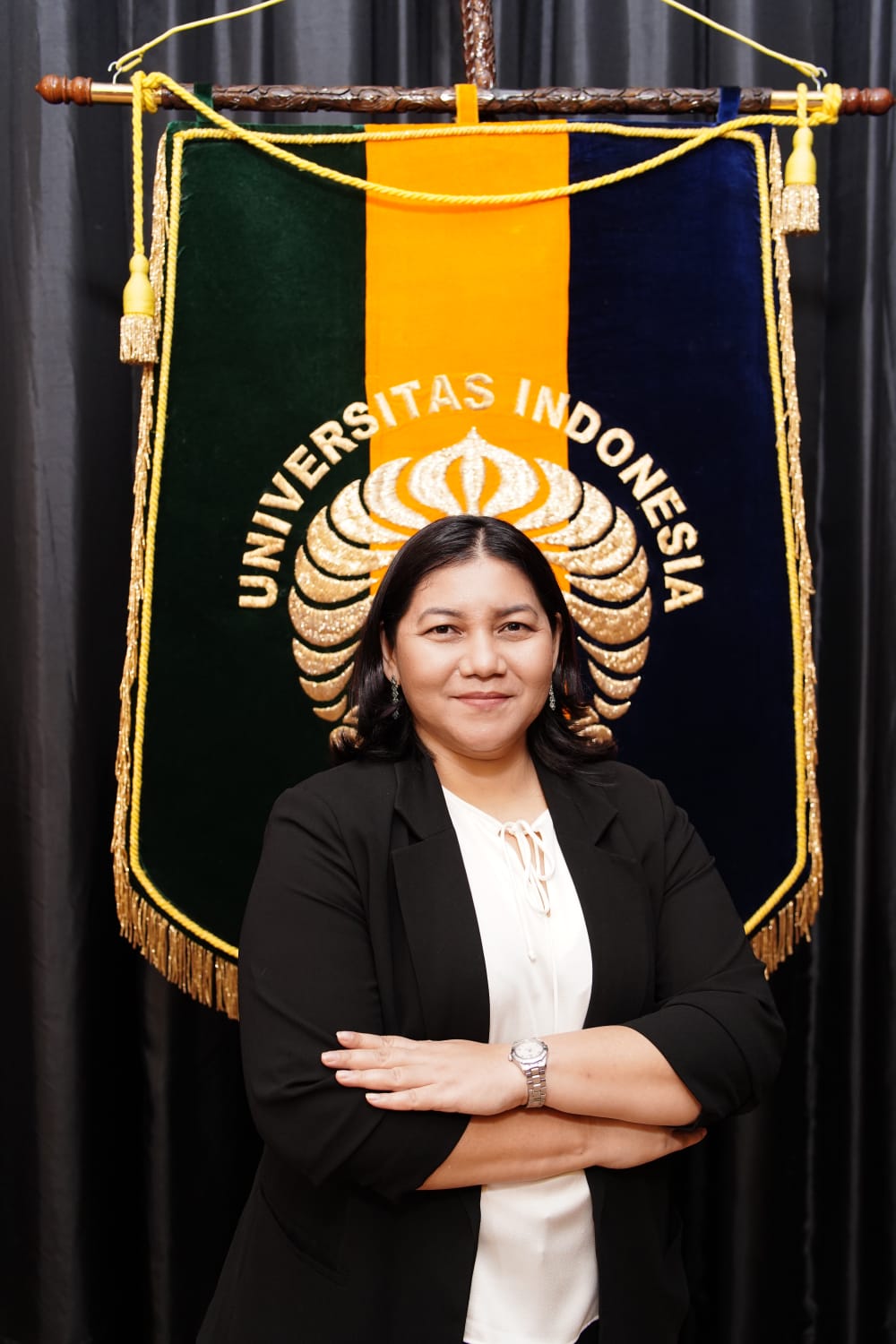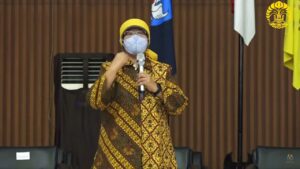
Universitas Indonesia (UI) welcomed new students for the 2022/2023 academic year on the second day, Tuesday (09/8) through a series of hybrid Introduction to Campus Life for New Students (Pengenalan Kehidupan Kampus Bagi Mahasiswa Baru, PKKMB) activities at Balairung, UI Depok Campus. “When you finish your education at UI and enter the work area and then serve the community, smart is not enough because all are equally smart and we have a lot of competition from other smart children. Therefore, what is seen is the extra values or advantages that all of you have. Judging from leadership and being able to work together,” said UI Secretary, Dr. Agustin Kusumayati, M.Sc., Ph.D., in her speech giving directions to new students.
Agustin said that being human is not enough to be smart and clever. But you have to be polite, you have to be able to get along well with people, and you have to know your manners. On the second day of PKKMB, UI introduced the academic system, Merdeka Belajar Kampus Merdeka (MBKM) policy, about student affairs, scholarships, facilities, and achievements, to education related to mental health and prevention and handling of sexual and drug violence.
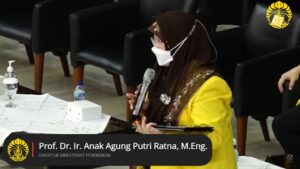
In his presentation, the Director of the Directorate of Education, Prof. Dr. Ir. Anak Agung Putri Ratna, M. Eng., said that the study load and study period are very important. For the undergraduate education level must complete 144-160 Semester Credit Units with a study period design in 8 semesters and a maximum of 12 semesters, and can be completed in 7 semesters. “The curriculum structure of study programs at the undergraduate level consists of compulsory courses and elective courses. Compulsory courses consist of university compulsory courses, compulsory courses of science clusters if any, compulsory courses of the faculty, and compulsory courses of the study program,” he said.
UI also has a fast-track program that accelerates students who have excellent academic abilities. There are two fast-track programs at UI, namely the Bachelor-Master education program (Fast-Track) in the same field of science taken in a maximum of 10 semesters; and the Bachelor-Doctor education program which is taken in a maximum of 12 semesters. Then, there are types of academic status, namely active, inactive (vacant), leave, studying outside the university, overseas, sanctioned, graduated, expelled, resigned, and passed away.
Furthermore, Director of the Directorate of Academic Development and Learning Resources, Drs. Gatot Fatwanto Hertono, M.Sc., Ph.D., said that UI organizes its learning activities based on Student Center Learning (SCL) or student-centered learning. “Next semester, UI has implemented offline classes although we still have to maintain health protocols so that the possibility of offline is not 100% of students entering the class simultaneously. So, some take turns following offline and online,” he said.
He explained that Evaluation of Learning Outcomes (ELO) is a systematic and periodic process to measure and assess the quality of learning processes and outcomes. The aspects measured in the ELO are academic ability and behavioral skills. The implementation of ELO is carried out in several ways, including observation, assignments, written or oral exams through quizzes, midterm exams, and end-of-semester exams, and final assignment exams.

Meanwhile, the Head of the Center for Independent Learning (CIL), F. Astha Ekadiyanto, S.T., M. Sc., said that CIL is a place to support independent learning at UI. “Learning is a skill that you will master. The foundation is in Permendikbud No. 3 of 2020, namely students can carry out learning activities within the study program and outside the study program. Meanwhile, it is called independent because you decide what you want to learn,” he said.
The Merdeka Belajar-Kampus Merdeka (MBKM) program has eight forms of activities, namely, student exchanges, internships, teaching assistance in educational units, research, humanitarian projects, entrepreneurial activities, independent studies or projects, building villages or thematic real work lectures. In this case, there is a process to follow the UI MBKM, namely 1) Students consult with their academic supervisor; 2) Academic supervisor approves; 3) apply for recommendation via CIL; 4) register to kampusmerdeka.kemendikbud.go.id/cil.ui.ac.id; 5) process the selection results by submitting a statement of absolute responsibility known by CIL; 6) carry out MBKM and get guidance, report the results of activities, carry out the credit transfer process, get a dean’s certificate of credit transfer; and 7) entered into SIAKNG and recorded in PD-Dikti reporting.
He also explained about student facilities consisting of student activity center, gymnasium, hockey field, stadium, outdoor tennis court, yellow bus, sports facilities, makara satellite clinic, student dormitory, services for disabled students, and facilities in each faculty.
“This is important for you, especially those who need help, that there are scholarships whose information can be seen at the beasiswa.ui.ac.id link. So, what we help are students who have financial constraints in the Regular Undergraduate program. However, it does not rule out the possibility in the Parallel, International Class, or Vocational Undergraduate Program when experiencing changes in financial ability, you can contact the faculty student affairs department,” said Astha Ekadiyanto.
The following is the flow of scholarship registration specifically for UI students, namely first, logging in to beasiswa.ui.ac.id using the student’s UI SSO account and students can see various scholarship offers on the web. Second, students fill out the registration form and complete the files. Third, students submit the scholarship application. Fourth, students wait for the scholarship selection process. Finally, students are informed of the scholarship announcement.
Furthermore, the Head of Makara UI Satellite Clinic, Dr. dr. Dhanasari Vidiawati Sanyoto MSc. CM-FM, Sp.DLP, FISPH, said that the Makara UI satellite clinic has the motto ‘Your trusted primary health care’. “We have received the highest accreditation for clinics and health centers nationally. The Satellite Clinic has a new paradigm that we are not only a health service but we are a vehicle for education and research,” he said.
Dhanasari also explained the facilities at the satellite clinic, which consist of registration, nursing care, family doctor, dentist, psychological counseling, laboratory, pharmacy, and health training.
In the last session, Deputy Chairperson of the UI Student Executive Board, Arinny Shafira said that based on article 1 paragraph (1) of the Permendikbud-Ristek PPKS defines sexual violence as any act of degrading, humiliating, harassing, or attacking a person’s body and reproductive function. This occurs because of unequal power or gender relations that result in psychological or physical suffering that disrupts one’s reproductive health and the loss of the opportunity to carry out higher education safely and optimally.
“Inequality in power relations is one of the factors that cause sexual violence. Power relations occur when the perpetrator feels they have a more dominant position than the victim or the perpetrator is the party who has power in a relationship,” she said.
Arinny explained 11 types of sexual violence, namely 1) conveying sexually suggestive remarks, jokes, whistles to the victim; 2) intentionally exposing the genitals without the consent of the victim; 3) speech that discriminates against the victim’s physical appearance, body condition, or gender identity; 4) sending sexual messages, photos or information; 5) intentionally peeping at a victim who is engaged in private activities; 6) tricking the victim into pregnancy or abortion; 7) giving sexualized punishments; 8) inducing, offering, promising or threatening the victim to engage in sexual activity; 9) undressing the victim without the victim’s consent; 10) practicing culture of the community, students, and/or educators with sexual violence; and 11) committing rape and intentionally permitting sexual violence.
The presentation was continued by the Deputy Head of the Strategic Studies Department of UI Student Executive Board 2022, Revisa Ayunda, who said that the importance of the phrase of no consent from the victim in identifying acts of sexual violence aims to clarify that the form of sexual violence in question can only qualify as sexual violence if the victim who is harmed does not agree. In this case, there are five conditions for an agreement to be fulfilled, namely 1) freely given i.e. given consciously without pressure; 2) reversible i.e. given when already aware of the impact, consequences, and risks; 3) informed i.e. applies to the specific activities that have been approved; 4) enthusiasthic i.e. consent can be revoked at any time; and 5) specific i.e. consent must be given on one’s own terms.
The UI Student Executive Board representative also gave exposure to the freshmen what to do if they experienced sexual violence. “First, immediately stay away from the scene of sexual violence and ask for help; Second, save all evidence of sexual violence; Third, seek information from related institutions; and finally, avoid suppressing the problems experienced. Meanwhile, when we see incidents of sexual violence, the things that must be done are distract, delegate, document, delay, and direct,” said Arinny.
Writer: Amindy | Editor: Mariana S

